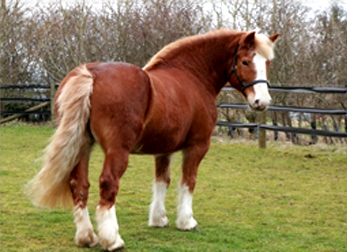Horsezone News
Obesity in Horses on the Rise
 It isn't just people that have gotten fatter, as society has converged on the Utopian ideal of enough food for everyone at low cost. It seems over 20 percent of horses are overweight or obese too. A pilot study carried out by The University of Nottingham's School of Veterinary Medicine and Science and published in Veterinary Record showed that rates of obesity among horses are likely to be just as high as they are among people, a condition that can lead to laminitis and equine metabolic syndrome.
It isn't just people that have gotten fatter, as society has converged on the Utopian ideal of enough food for everyone at low cost. It seems over 20 percent of horses are overweight or obese too. A pilot study carried out by The University of Nottingham's School of Veterinary Medicine and Science and published in Veterinary Record showed that rates of obesity among horses are likely to be just as high as they are among people, a condition that can lead to laminitis and equine metabolic syndrome.
Yes, horses can have metabolic syndrome also.
The study was conducted by third year veterinary student Helen Stephenson and assessed the prevalence of obesity among horses whose owners were registered with Oakham Veterinary Hospital, one of the school's clinical associates specializing in the treatment of horses. The results showed that English horses, as was already found in Scottish horses, are getting really fat.
Five hundred owners were sent questionnaires, none of them kept horses for breeding, livery, riding stables, or competition, so were all classed as keeping their animals for leisure only. Of the 160 returned one in five showed that their horses were either overweight or obese. The owners were asked about their perceptions of their horses' body condition, and asked to score this from zero to five, with a score of more than 3 indicating overweight.
Grass was the main source of forage for half the horses and coarse mix was the main source of concentrate feed in a similar proportion. Only one in 10 horses was not fed any concentrate.
The researchers then assessed the body condition of 15 randomly selected horses to see if the scores had under or overestimated the horse's weight. They assigned an average score that was significantly higher for these horses; eight of the owners had scored their horse at least one grade lower than the researcher had, indicating that the owners had underestimated their horses' weight.
On the basis of the researchers' findings, the authors estimate that the true prevalence of overweight/obesity was likely to be 54% rather than the 20% indicated by the questionnaire responses. So incidence of obesity is a multi-species problem, affecting both humans and their companion animals and just as we need to be careful, for our health's sake, not to become too overweight, we need to watch our horses' food in-take.
Some tips for controlling your horse's weight include:
- monitoring pasture consumption - if you have so much grass that your horse is getting too fat simply grazing, try and lock him up or tie him up for several hours to limit the intake of grass. Remember ponies especially need monitoring if there is plenty of good pasture available, as they tend to become overweight just on the smell of grass!
- do not over feed processed feeds or grain - follow instructions on how much to feed, which should be detailed on the bag and remember if your horse is not in work, cut back the amount of grain being fed.
- Do not over feed lucerne hay - monitor your horse's weight and if he's becoming fat, try to feed a more grassy hay.
- Try to give your horse exercise - if he's not being ridden regularly, make sure there is some other way to keep in him good condition by providing turn out time in a paddock, lungeing or using an automated walker, if available.
- Be careful with the treats - horses can actually get very fat on carrots!
News Search
Categories
- General
- Event Results
- Stallionzone
- Sponsored Shows
- Clubs
- Health
- Feature Horses
- Competitions
- Five Minutes With Horsezone
- Young Riders
- Reviews
- Training and Clinics
- Postcards from the saddle
- 2014 Equitana by HORSE FIRST
- 2013 Equitana
- 2012 Equitana
- 2012 London
- 2011 Equitana
- 2011 Queensland Floods
- 2010 WEG
